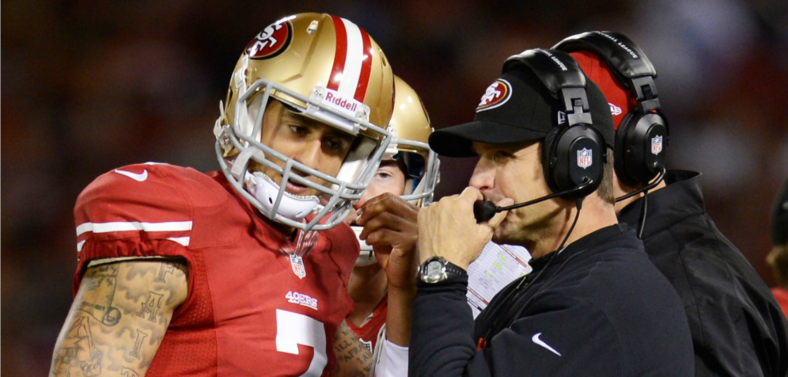
When the San Francisco 49ers benched Alex Smith in favor of then wide-eyed second-year quarterback Colin Kaepernick during the 2012 season, skeptics concluded that the decision made little sense. Why bench a player that had led your team to the NFC Championship game the season prior, some said.
And I fell under that category.
Kaepernick seemed far from being a starter-caliber quarterback during the preseason that summer. He struggled with pocket awareness, couldn’t make the necessary reads to spread the ball around and lacked intermediate touch on his passes.
The former Nevada quarterback proved us all wrong, leading San Francisco to the Super Bowl that season. His performance against the Green Bay Packers in the lead up to the big game in New Orleans instantly made Kaepernick a legend in Northern California.
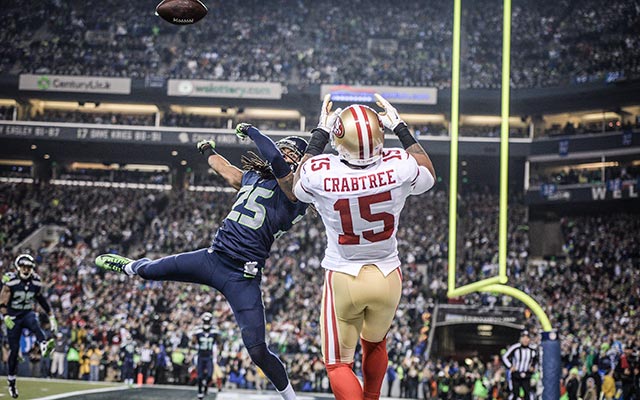
Courtesy of CBS Sports: 49ers were THIS close to a second straight NFC title in 2013.
While Kaepernick struggled with consistency issues last season and didn’t seem to progress at the level most expected, the 49ers still were a few inches from earning a second consecutive trip to the Super Bowl. Looking at it directly through a box-score scouting mentality, Kaepernick has been one of the most successful young quarterbacks in the recent history of the NFL. He boasts a 17-6 career regular season record and has tallied 40 touchdowns compared to 11 interceptions in 23 regular season starts.
So what is the point of this article, some may ask?
It’s rather simple. Kaepernick seems to have improved in nearly every single aspect that plagued him in the minds of scouts heading into the 2011 NFL draft. As evidenced late last season and through two meaningless preseason games this year, Kaepernick seems to be doing a much better job progressing through his reads and finding his checkdowns. This will go a long way in helping him improve as an all-around quarterback moving forward.
But much like other dynamic young quarterbacks, Kaepernick must be allowed to play his game in order for the 49ers to get the most out of his ridiculous on-field ability. And the team seems to be straying away from that a great deal at this point, which should be cause for alarm for fans in Northern California.
Kaepernick averaged less than six rush attempts per game last season. And when he ran the ball less, Kaepernick’s game-changing ability was severely limited. In outings where he attempted less than five attempts, Kaepernick’s quarterback rating stood at 94.2. He tallied 12 touchdowns compared to three interceptions and averaged 191 passing yards in those eight outings. The 49ers also averaged 26.1 points per game and were 6-2 in those eight outings.
On the surface, that seems pretty darn good.
But we have to look at Kaepernick’s performance when he actually took off with the ball five-plus times. He put up a lower quarterback rating (88.9), but did put up more total touchdowns (13) while leading the 49ers to 27-plus points six times in those eight starts.
These numbers don’t tell the entire story. Kaepernick is much more comfortable when he has the ability to tuck and run as often as he likes. Just look at his postseason performances thus far. The young quarterback has put up over 500 rushing yards in six career playoff starts. In the process, San Francisco is averaging a whopping 28 points per game in those starts.
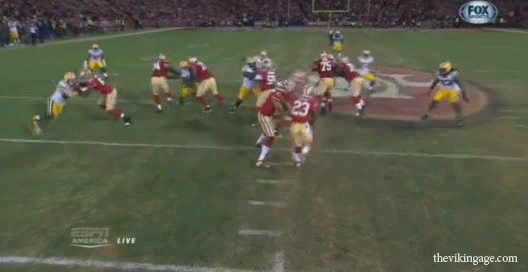
Simply put, give Kaepernick the run/pass option and he will keep defenses off balance throughout the game. Without this, the 49ers aren’t using Kaepernick to the best of his ability. And that could very well impact the team’s success down the line.
The issue here, and it’s a doozy, is the fact that San Francisco has not had any trust in its backup quarterbacks to come on to the field and have success if Kaepernick goes down to injury. This severely limits its willingness to let the big-bodied quarterback utilize his natural playing ability when Sundays roll around.
Here is a prime case study.
When Kaepernick replaced Smith as the 49ers starter in the second half of the 2012 season, they had more than a capable backup option should the former go down with an injury.
The results were immediate, as San Francisco allowed Kaepernick to play more of a natural game on the field. He responded by averaging 50 yards and nearly seven rush attempts per game, postseason included. In turn, the 49ers put up a 7-3 record and averaged nearly 30 points per game.
Fast forward to the 2013 season and the 49ers simply didn’t have the necessary confidence in then backup Colt McCoy to get the job done. This limited their ability to let Kaepernick do what he does best…create a dynamic run/pass option.
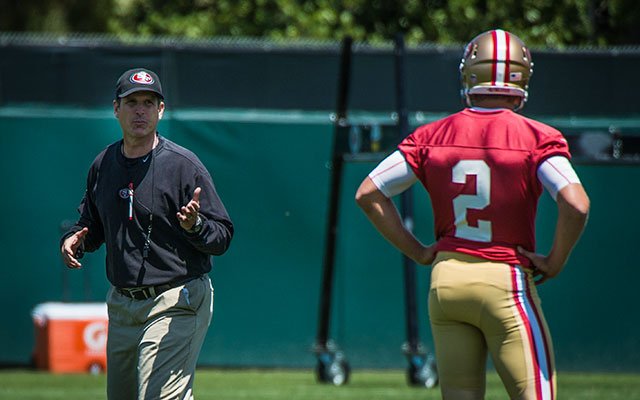
Courtesy of CBS Sports: The Blaine Gabbert experiment has been an utter disaster.
With a full offseason to upgrade the backup quarterback situation, the 49ers have failed at every turn. They acquired former Jacksonville Jaguars bust Blaine Gabbert in a trade prior to the draft and signed veteran journeyman Josh Johnson to a non-guaranteed deal. The hope was that the quarterback guru himself, Jim Harbaugh, could help Gabbert turn around what had been a disastrous career in Jacksonville.
Through two preseason games, this task has been an utter failure. Gabbert has compiled a 17.9 quarterback rating and has failed to lead the 49ers to a single point in eight possessions. To make matters even more laughable, the 49ers have tallied a total of 85 yards in those eight possessions. For his part, Gabbert has yet to complete a pass of 10 yards or more in his 25 pass attempts this preseason.
With all the problems San Francisco has had thus far this preseason, it has put up 130 yards in Kaepernick’s three possessions. That represents 31 percent of the 49ers total yardage output through two games. Overall, the 49ers are averaging nearly 44 yards per possession with Kaepernick under center and just 15.1 yards when he’s on the sideline.
It doesn’t take a genius to figure out that these splits aren’t going to work, especially if Kaepernick misses some time during the regular season due to injury. And that’s precisely why the 49ers have held him back from running in the past. The decision makes sense in the grand scheme of things, but there are a couple factors at play here.

Courtesy of Fox Sports: 49ers are worried about similar hits on Kaepernick.
Some point to Robert Griffin III’s injury-plagued 2013 season as a reason why the 49ers should be more cautious with Kaepernick. On the surface that might make some sense. Looking further into it, however, there is more to this than meets the eye. Kaepernick is built stronger than RGIII and understands full well when to avoid the hit. Much like Russell Wilson in Seattle, the 49ers quarterback will not take the unnecessary hit against larger defenders. He will either slide or go out of bounds. This has been his MO since taking over for Smith back in 2012.
In addition to that, it seems that the 49ers’ unwillingness to let Kaepernick play his game on the football field is a direct result of them not boasting a viable backup quarterback behind him.
At what cost?
San Francisco could have very well made a play for Mark Sanchez, Michael Vick, Shaun Hill or Tarvaris Jackson. All four would have been better options on the free-agent market than trading for Gabbert.
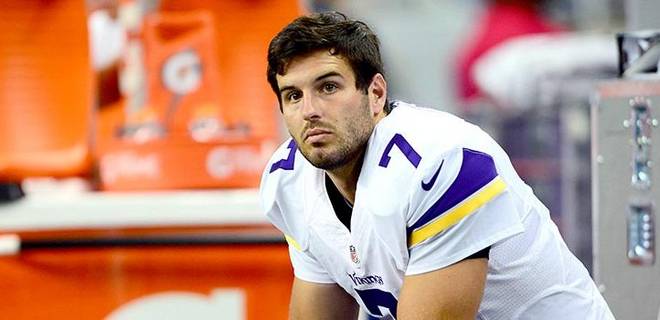
Courtesy of USA Today: You can’t tell me Ponder isn’t a better option than Gabbert.
While it’s foolish to look at past mistakes, the 49ers have an opportunity here. They boast one of the deepest overall rosters in the NFL and don’t necessarily have the room to add late-round picks to the roster in coming years. Why not go out there and trade for a Sanchez or Christian Ponder, the latter of whom will come on the cheap? Both may have their issues as starters in the NFL, but they are more than capable backups.
The difference between Brock Osweiler & Blaine Gabbert is a mile wide. #49ers backup QB situation is bottom 5 in the NFL
— John Middlekauff (@JohnMiddlekauff) August 18, 2014
It makes little sense for the 49ers to hold on to Gabbert and his $2 million guaranteed contract while refusing to give up a mid-to-late round pick. That could very well derail what many consider to be a season in which the 49ers have championship aspirations.
After all, the focus here isn’t on whether the 49ers could succeed with a backup on the field for an extended period of time. Rather, it’s all about having trust in said backup in order to let Kaepernick do what he does best on the football field. Short of that, we may continue see stunted growth on Kaepernick’s part.
Photo: Washington Post